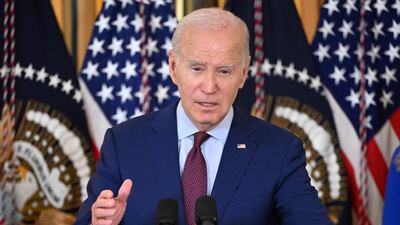President Joe Biden signed an executive order on Wednesday that restricts US investment in the Chinese technology sector in a move aimed at curbing capital that could boost Beijing’s military and intelligence systems.
The new programme seeks to prevent US investments from helping accelerate the indigenisation of military, intelligence, surveillance or cyber-enabled technologies in China, including semiconductors and microelectronics, quantum information technologies, and “certain artificial intelligence systems”.
“This is a national security action, not an economic one,” a senior administration official said on a press call.
The order is “a narrow, initial step”, another administration official added. It will not take effect until next year after a comment period, as Washington works to fine-tune the “complex” nature of the industry it touches on, they said.
“We need industry to help get this right for our national security,” said one of the officials.
Beijing quickly condemned the order, with Chinese embassy spokesman Liu Pengyu saying Washington “habitually politicises technology and trade issues and uses them as a tool and weapon in the name of national security”, The Washington Post reported.
Chinese state-owned newspaper The Global Times called the executive order a “clumsy” move “aimed at decoupling and breaking industrial supply chains and weaponising economic and trade issues”.
The order comes amid an on-again, off-again cooling of relations between Washington and Beijing.
US Secretary of State Antony Blinken delayed a China visit earlier this year after Washington accused Beijing of flying a high-altitude spy balloon over US territory.
Previously, Beijing broke off some mid- and high-level engagements with US officials last August, including over climate issues, to show its anger with then-House of Representatives speaker Nancy Pelosi’s trip to Taiwan.
Mr Blinken on Thursday said he expected Wang Yi, the recently reappointed Chinese Foreign Minister, to visit the US after Washington extended a formal invitation earlier in the week.
The Biden administration said it shaped the executive order after “extensive consultations” with Washington's allies and partners, including those in the G7.
The US sees the executive order as building up the bloc's “tool kit” after agreeing at a recent Hiroshima summit on “a shared national security interest in ensuring that our most advanced military relevant, national security relevant technologies don't feed the military and intelligence modernisation of our rivals”.
Treasury Secretary Janet Yellen had addressed the order during a visit to Beijing this summer, in a bid to reassure Chinese officials that any US action would be “highly targeted”.
“I want to allay their fears that we would do something that would have broad based impacts on the Chinese economy … That's not the intention,” Ms Yellen said at a July press conference.
The executive order comes weeks after the Senate overwhelmingly backed legislation requiring US firms to notify the Treasury when investing in advanced Chinese technology.


